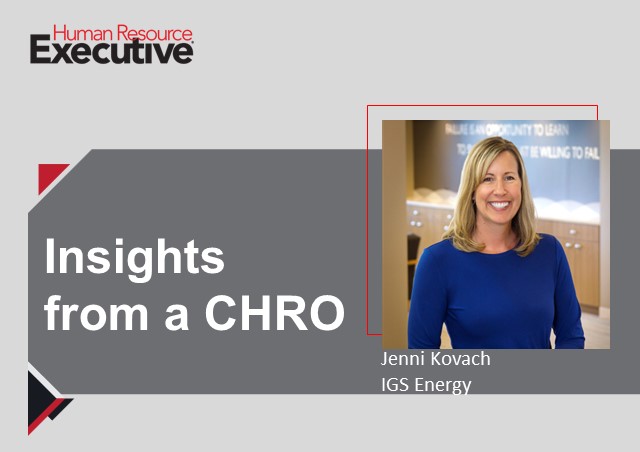As the post-pandemic world of work comes into sharper view, one thing is clear to most employers: Workers want purpose. Even as the Great Resignation slowly fades into the Big Stay, new employee expectations about what their employer stands for aren’t likely to diminish.
The power of purpose isn’t new to IGS Energy, an Ohio-based natural gas and electric supplier, with more than 1,000 employees and 1 million customers throughout the U.S. The organization has long practiced “conscious capitalism,” says Jenni Kovach, chief people officer.
“A big piece of our business is purpose over profits, and throughout our business decisions, we’re thinking about all stakeholders,” she says. “We worry, we think and we are always concerned about all of our stakeholders.”
What does conscious capitalism in action look like? For the organization, a founding member of the Columbus chapter of nonprofit Conscious Capitalism, it means pledging to be carbon-neutral by 2040. Meanwhile, its Clean Energy for Everyone program invests in nonprofits that support those impacted by climate change and high energy costs, among other issues.
That spirit hasn’t wavered as the organization has grown—with the workforce expanding tenfold during Kovach’s 14 years with the company. IGS’ attention to the community and environment has been a driving force behind the company’s solid employee engagement and experience, she adds.
For example, IGS’ engagement rate sits around 95%, the organization is certified as a Great Place to Work and it recently ranked fifth on the Top 50 Inspiring Workplaces list.
Kovach recently shared with HRE how the organization has stayed true to its core values while continuing to evolve its people strategy.
HRE: As a longtime IGS employee, what is it about the company’s culture that has personally resonated with you?
Kovach: I have been with IGS for 14 years. When I started, we had 150 employees, and we now have about 1,500—so, a lot of growth in that period. One thing that has been the foundation of our culture from day one is that we are a family-owned, private company. We are a family; even with 1,500 people, we get to know each other really well. The people I work with are incredibly smart but also super fun, and that’s one of the things I’ve loved about IGS since day one. We all care about each other. We come in, we do great work but we have fun doing it. And that’s stayed consistent in 14 years.
HRE: Given the organization’s growth during your time, what are some HR lessons learned?
Kovach: One thing looking back that I think took us a little bit more time to determine than it should have is that we actually had to put our values into words. So, we defined our values and did that based on describing our culture—versus, what a lot of companies do: Define the values to establish the culture. That was a big difference. When you’re smaller and start to grow and have employees throughout the country, it becomes even more important that people are aligned on what the foundational values are. We defined those in 2011 and we just updated them a couple years ago as we moved into more of a remote environment.
HRE: Speaking of, where does the company stand on remote versus hybrid versus on-site?
Kovach: We are about 80% remote, with about 20% who are hybrid. We determined pretty early on in the pandemic that we were working really well together [remotely]. So now, we look at the job profiles and determine if it’s a job that can work remotely. And that’s worked really well for us.
HRE: Employee engagement has been a big focus of yours. How is the company managing engagement in the post-pandemic world?
Kovach: It’s been a hard five years for people in general, and especially folks in HR because there has been a lot of change. One of the things we put an emphasis on—and this started actually before the pandemic, which I’m very thankful we did—was mental health and wellbeing. It’s a big topic right now, but we started four or five years ago really expanding mental health support for our employees. That was huge as they navigated not only the pandemic but different work environments; many folks were going into an office every day and all of a sudden they’re home and many were alone. That took a toll.
Click here to read more Insights from a CHRO.
HRE: What is your greatest HR challenge today?
Kovach: For us, it’s continuing that personal connection with the workforce—when you don’t get the in-the-hallway conversations or grabbing lunch during the day. A big part of our culture has always been togetherness, so we’re really trying to recreate opportunities for employees to feel that togetherness, whether they’re in Arizona or Michigan. We’re investing heavily in bringing people together; even if they are remote, we have a number of in-person meetings, we have parties, we have fun things people can engage with. Another big focus has been putting meeting norms in place so, if we do have a population in the office, those who are remote aren’t feeling out of the loop.
HRE: What are the skill sets that will be most important to success for the HR leaders of tomorrow?
Kovach: Flexibility and innovation. HR professionals have had to use creative muscles they haven’t worked on in a long time in the past few years, and I can see that continuing. There is more demand from employees—which I think is a great thing. And it makes HR professionals have to think outside of the box about how to best support the business.
I have tried to become much more creative as well, but more than anything I’m trying very hard to be open-minded. There are things I would never have anticipated encountering in my career that we’ve encountered over the past few years. So, being open-minded and thoughtful about my approach is something I’m working on every day and will continue to.
HRE: How has your life outside of work shaped the way you show up to the job?
Kovach: My personal life, and some of the challenges I’ve had in the past—especially from a health perspective—have really helped me put into perspective that not everything is urgent. Not everything has to be handled right away. I like to say that we aren’t brain surgeons—we can always pause and be thoughtful and make sure we’re considering the business, the employee, our other stakeholders when we’re making decisions.
Credit: Source link











